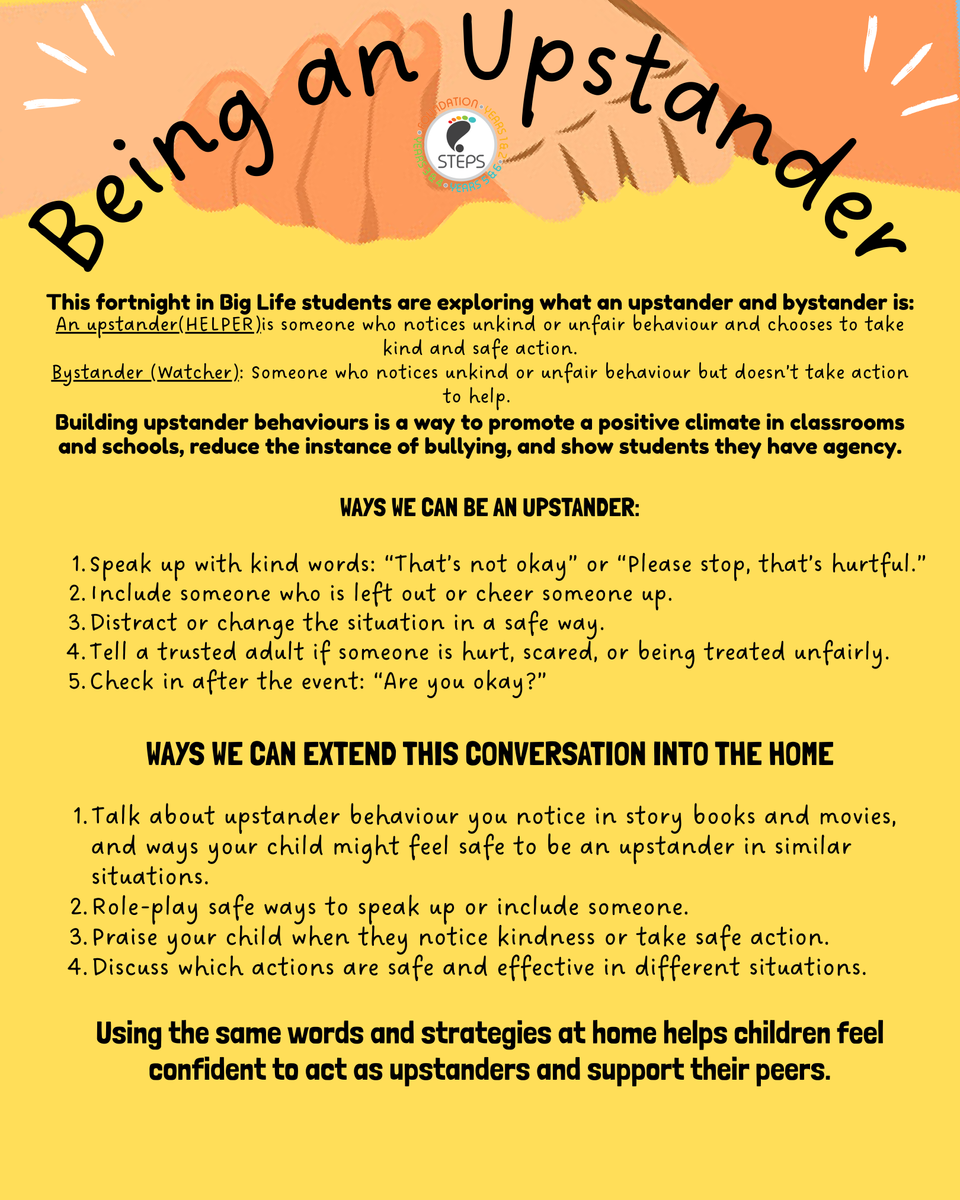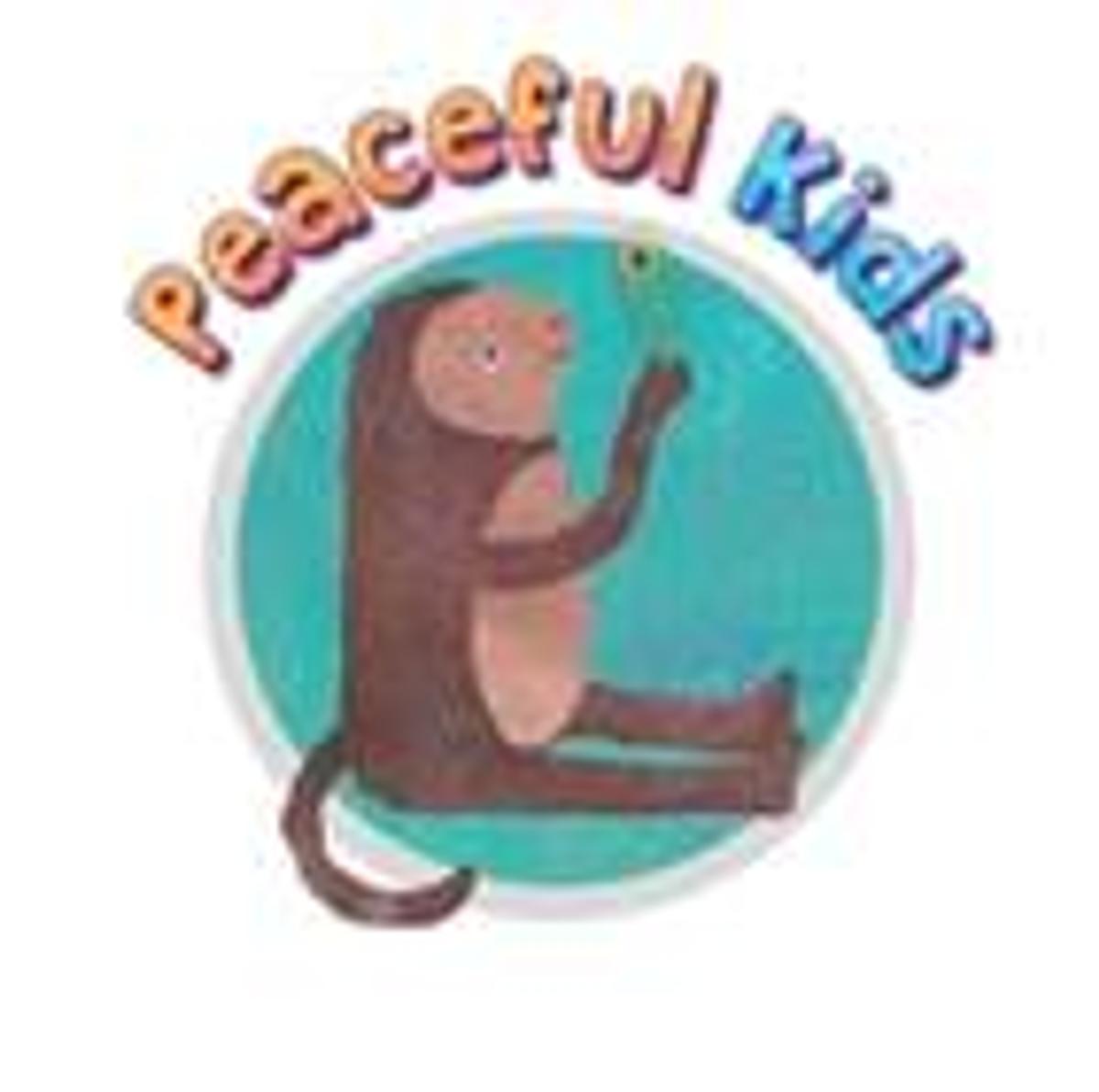Wellbeing

BIGLIFE - FOOTSTEPS
Term 4 - Week 1 & 2
In this Footsteps lesson, students are understanding what upstander and bystander behaviour is and explore safe ways that students might feel to be an upstander in different situations.
Welcome to Big Life - Footsteps
We are excited to be working with A Big Life implementing their Footsteps Program across all year levels in our school. The Program has been developed and informed by evidence and in collaboration with students, teachers, and parents of our local Warrnambool & District Schools, to ensure that it meets the needs of young people in our local context. The program also aims to lean into our schools’ current strengths and the great work that is already happening. The Footsteps Program is supported by Warrnambool Student Wellbeing Association, Fletcher Jones Foundation, La Trobe University, and the Department of Education.
The Footsteps Program provides classroom lessons and teacher professional development, to support students to build the skills and capacity to navigate life’s ups and downs and safeguard their mental health. Each fortnight students participate in a new Footsteps lesson and parents can access these resources through the Parent Website. https://sites.google.com/education.vic.gov.au/biglifefootstepsparentaccess/about-footsteps
We encourage parents to extend and support this learning and conversation at home.
In the classroom we are exploring what causes us to feel different zones.
Emotions can sometimes feel like a mystery, but when children understand why they feel a certain way, they are better able to manage challenges and make positive choices.
At school, we use the Zones of Regulation to help students recognize their emotions and what causes them. By identifying what triggers different emotions—like frustration when a task is difficult (Yellow Zone) or ‘optimistic’/’eager’ when something fun is planned (Green Zone)—students can understand their reactions and feel more in control.
Knowing the cause of their emotions also helps children communicate their feelings more clearly. If they realize they’re feeling tired and unfocused (Blue Zone), they can express that they need a break. If they recognize they are overwhelmed (Red Zone), they can begin to step back rather than react impulsively.
By developing this self-awareness, students build confidence in managing their emotions, strengthening relationships, and staying engaged in learning.
Warrnambool Primary School wellbeing runs Peaceful Kids groups to build skills around anxiety and stress management in our students.
A small group program is available for Years 3-6, and a modified classroom program for years Foundation to 2.
Please contact the wellbeing team if you are seeking support for your child’s anxiety symptoms and stress management skills, if you believe they could benefit from the program or would like a tip sheet for how you can support your child at home.
Peaceful Kids Program
‘Peaceful Kids’ is a Mindfulness and Positive Psychology based program to lessen anxiety and stress and increase resilience in children. The program gives children the skills, practice and support to utilize coping strategies that lessen the symptoms of anxiety and stress. The program also involves parental involvement and commitment to supporting the strategies at home.
Peaceful Kids Outcomes
| Program structure
|
If you would like some more information please visit the website; peacefulkids.com.au
Outside School Referrals
The Orange Door are a service available to support parents and carers of children from 0-18 years.
The Orange Door can help if:
- You are worried about the wellbeing and/or development of your child(ren).
- You need help to strengthen your parenting skills and develop positive family relationships.
- Your family needs help to get through stressful times, which may be caused by a range of reasons including separation, mental health, grief, drug and alcohol abuse, financial worries, illness or living with a disability.
- You need extra help managing the behaviour of your child(ren).
- Someone at home is making you, your children or another family member feel unsafe or afraid.
- You’re pregnant or a new parent and need support and advice.
- You have concerns for a vulnerable child in your community.
The Orange Door can help by:
- Listening to you to understand the difficulties you’re facing.
- Helping you to explore your options and think about what you want to do next.
- Working with you to improve you and/or your family’s situation.
- Connecting you to services that can help, such as parenting support groups, services for children, family violence support, counselling, financial help, or legal assistance.
- Providing advice to help you access funding for basic living and expenses and other costs.
- Providing information and advice to professionals if you are worried about a vulnerable child in your community.
To access The Orange Door you can walk in to 571-575 Raglan Parade, Warrnambool OR call 1800271180.
Gunditjmara Family and Community Services – Integrated Family Services
The Integrated Family Services (IFS) Program provides culturally sensitive, safe, confidential, professional advocacy and support services to vulnerable Aboriginal families living in South West Victoria who are requiring some extra parenting support.
The types of support – assisting parents/carers to make informed parenting choices regarding the safety, stability and development of their child/children such as:
- Advocacy
- Case Management
- Transport
- Court Support
- Counselling
- Referrals
- Mental Health support
- Personal support
- Housing
- Community development and education
- Early intervention strategies prevention
- Routines and Boundary strategies
- Budgeting
- Access information on housing, legal advice, income support, financial counselling, childcare, parenting, court support or other individual services as required.
At Gunditjmara our mob can walk in or call on 55591234.


